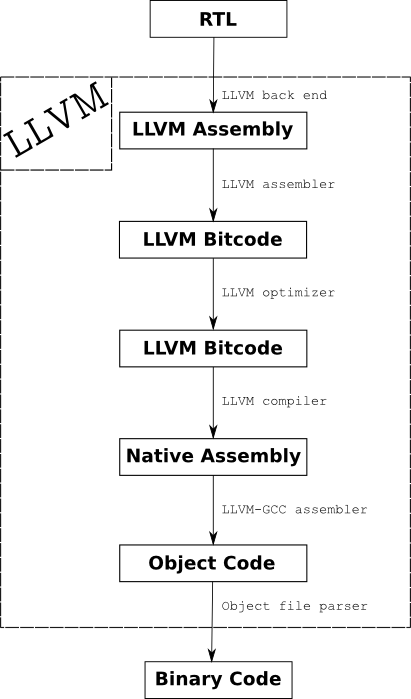前篇文章http://mryufeng.javaeye.com/blog/428845 讲述了如何启用erlang hipe支持,但是用户程序大量依赖的标准库如stdlib, kernel等默认都不是native模式的, 所以我们的程序虽然启用了hipe,但是只是部分启用了。用oprofile等工具可以看到我们的程序还是在process_main(虚拟机的代码解释 在这里)里面打转。 我们来个极致的,通通hipe化。
有2个方案可以解决:
1. 在编译otp_src的时候 export ERL_COMPILE_FLAGS=’+native +”{hipe, [o3]}”‘ 但是这个方案有个问题就是
native方式是和beam的模式有关的 如beam和beam.smp它的代码是不同的,但是所有的beam又公用一套库,这样只能舍弃一个了。所以这个方案就比较麻烦。
# erl
Erlang R13B01 (erts-5.7.2) [source][/source] [64-bit] [smp:8:8] [rq:8] [async-threads:0] [hipe] [kernel-poll:false]
Eshell V5.7.2 (abort with ^G)
1> %%没问题
#erl -smp disable
<HiPE (v 3.7.2)> Warning: not loading native code for module fib: it was compiled for an incompatible runtime system; please regenerate native code for this runtime system
....
Erlang R13B01 (erts-5.7.2) [source][/source] [64-bit] [rq:1] [async-threads:0] [hipe] [kernel-poll:false]
Eshell V5.7.2 (abort with ^G)
1>
这个也可以通过修改 alias erl=erl -smp disable 以便欺骗编译器生成单cpu模式的beam
去绕过去
2. 动态编译, 等系统运行起来以后,动态把相关的模块编译一遍,这个思路看起来最简单。
我做了个原型 证明这样是可行的。。。
# cat hi.erl
-module(hi).
-export([do/0]).
do()->
[ turn(M, P)|| {M, P} <-code:all_loaded(), P=/=preloaded].
turn(M, P) ->
P1 = binary_to_list(iolist_to_binary(re:replace(filename:join(filename:dirname(P), filename:basename(P, ".beam")), "ebin", "src"))),
L = M:module_info(),
COpts = get_compile_options(L),
COpts1 = lists:foldr(fun({K, V}, Acc) when is_list(V) and is_integer(hd(V)) ->[{K, tr(V)}] ++ Acc ; (Skip, Acc) -> Acc ++ [Skip] end, [], COpts),
c:c(P1, COpts1 ++ [native, "{hipe, [o3]}"]).
tr(P)->
binary_to_list(iolist_to_binary(re:replace(P, "/net/isildur/ldisk/daily_build/otp_prebuild_r13b01.2009-06-07_20/", "/home/yufeng/"))). %%%这个地方要根据实际情况调整 具体的参看 m(lists).
get_compile_options(L) ->
case get_compile_info(L, options) of
{ok,Val} -> Val;
error -> []
end.
get_compile_info(L, Tag) ->
case lists:keysearch(compile, 1, L) of
{value, {compile, I}} ->
case lists:keysearch(Tag, 1, I) of
{value, {Tag, Val}} -> {ok,Val};
false -> error
end;
false -> error
end.
#erl -nostick
Erlang R13B01 (erts-5.7.2) [source][/source][/source] [64-bit] [smp:8:8] [rq:8] [async-threads:0] [hipe] [kernel-poll:false]
Eshell V5.7.2 (abort with ^G)
1> mnesia:start(). %启动我们的应用程序
ok
2> hi:do().
[{ok,io},
{ok,erl_distribution},
{ok,edlin},
{ok,error_handler},
{ok,io_lib},
{ok,hi},
{ok,filename},
{ok,orddict},
{ok,gb_sets},
{ok,inet_db},
{ok,inet},
{ok,ordsets},
{ok,group},
{ok,gen},
{ok,erl_scan},
{ok,kernel},
{ok,erl_eval},
{ok,ets},
{ok,lists},
{ok,sets},
{ok,inet_udp},
{ok,code},
{ok,ram_file},
{ok,dict},
{ok,packages},
{ok,gen_event},
{ok,heart},
{ok,...},
{...}|...]
3> m(dict).
Module dict compiled: Date: August 23 2009, Time: 17.20
Compiler options: [{cwd,"/home/yufeng/otp_src_R13B01/lib/stdlib/src"},
{outdir,"/home/yufeng/otp_src_R13B01/lib/stdlib/src/../ebin"},
{i,"/home/yufeng/otp_src_R13B01/lib/stdlib/src/../include"},
{i,"/home/yufeng/otp_src_R13B01/lib/stdlib/src/../../kernel/include"},
debug_info,<span style="color: red;">native,"{hipe, [o3]}"</span>]
Object file: /home/yufeng/otp_src_R13B01/lib/stdlib/src/../ebin/dict.beam
。。。
看到了是用native模式编译的哦。。。
不过编译过程中有几个模块是有点问题, 得改进下。


Recent Comments